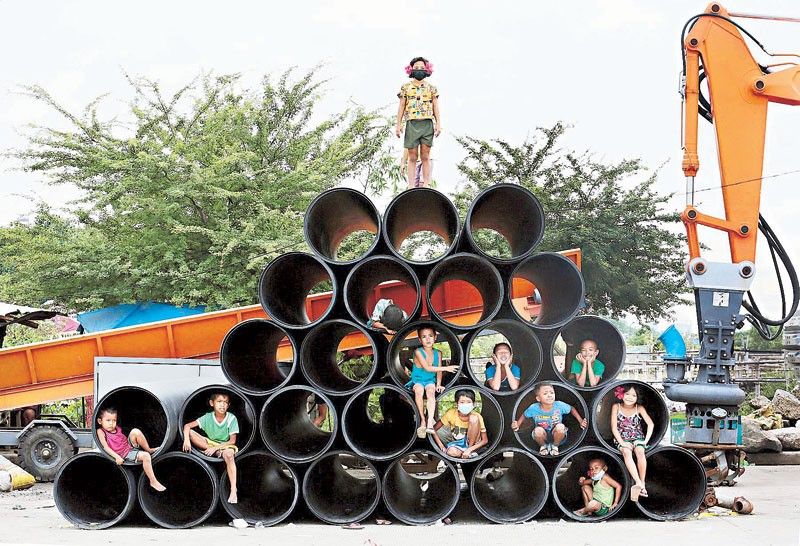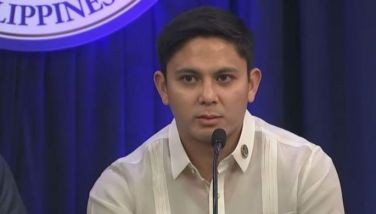IATF further relaxes age restrictions in MGCQ areas

Children aged 10-14 allowed to go out
MANILA, Philippines — To boost economic activity, children as young as 10 will be allowed to go out of their houses in areas under modified general community quarantine (MGCQ) starting Feb. 1, Malacañang said yesterday.
“Any person below 10 years old and those who are over 65 years of age shall be required to remain in their residence at all times,” the Inter-Agency Task Force for the Management of Emerging Infectious Diseases (IATF) said in its latest Resolution No. 95.
Presidential spokesman Harry Roque Jr. gave the announcement ahead of President Duterte’s decision on whether or not a stricter quarantine will be implemented with the emergence in the country of the new UK variant of COVID-19.
Roque said the relaxation of age restrictions for going out in public must be accompanied by strict compliance with minimum health protocols.
Local government units (LGUs), on the other hand, are enjoined to adopt the same relaxation of age restrictions for areas under general community quarantine (GCQ).
Department of Health (DOH) Undersecretary Maria Rosario Vergeire said the new age limit was proposed by the economic cluster to the IATF “so that we can be able to at least start recovering economically.”
“The rationale for this was we balance the economy with health,” she explained at a press briefing.
In this light, Vergeire urged LGUs to “implement properly and enforce” health protocols against COVID-19 like hand washing and sanitizing, proper wearing of face masks and shields and physical distancing.
“As long as we are compliant (with minimum health protocols), we are protected (from COVID-19) and we are assured that the infection risk will be very low, regardless of age,” she said.
Trade and Industry Secretary Ramon Lopez told TeleRadyo that sales of businesses may double or even triple, following the IATF decision.
“Based on the assessment of many of those in retailing, commercial areas, malls, when parents go out with their children, their consumption increases,” he said.
Noting that around 30 to 50 percent of sales are accounted for by families, Lopez said they are also studying the reopening of more establishments, including museums.
As of this month, sales of retailers are still down compared with where they were before the pandemic.
“If sales continue to fall, they might cut jobs and that is what we are afraid of because it would be hard for businesses to recover,” he said.
In response to the new development, the Philippine National Police (PNP) is enhancing visibility patrols to boost security as more people are allowed in public places.
Gen. Debold Sinas, PNP chief, said the move is necessary as criminals could also intensify their illegal activities with more targets out on the streets.?“Economic activity poses a challenge for us because there are more people going out,” he said in Filipino in an ambush interview at Camp Crame, Quezon City.
Prior to Feb. 1, only those who are 15 to 65 years old are allowed to be outside of their homes.
IATF policy updates
During the 95th IATF meeting, the task force also ratified the National Deployment and Vaccination Plan for COVID-19, which shall serve as a guide for vaccination implementers such as the LGUs.
In the same directive, the IATF approved the request of the Professional Regulation Commission to conduct and administer the licensure examinations for professionals scheduled for January to March 2021.
Meanwhile, the IATF amended its earlier issuance of IATF Resolution No. 92 on all foreign travelers covered by travel restrictions because of the new COVID-19 variants.
Foreign nationals with valid visas, which include personnel of accredited international organizations, and spouses and minor children of Filipino citizens traveling with them, are exempted from the travel ban.
The IATF and the DOH mandate that those who arrive for medical and emergency cases, including their medical escorts, if any, are now subject to applicable testing and government-imposed quarantine protocols.
They also ruled that Filipino citizens from countries/jurisdictions where travel restrictions for new COVID variants are in place, or who have been to the same within 14 days immediately preceding arrival, shall be subjected to the prescribed testing and quarantine protocols.
This also applies to their spouses and minor children traveling with them.
Filipino citizens arriving for highly exceptional and/or medical reasons and local diplomats are now subject to applicable quarantine protocols as prescribed by the DOH.
On testing and quarantine protocols, passengers coming from or transiting through countries where travel restrictions are in place due to new COVID-19 variants shall be tested upon arrival and quarantined until the result of a subsequent or second test administered on the fifth day from arrival is released.
Also amended were sections related to hotels or accommodation establishments on the Omnibus Guidelines on the Implementation of Community Quarantine in the Philippines as proposed by the Department of Tourism.
“The continued implementation of pro-active measures is necessary to ensure the utmost protection of the health of the Filipino people,” he said. – Sheila Crisostomo, Louella Desiderio, Manny Tupas
- Latest
- Trending





























